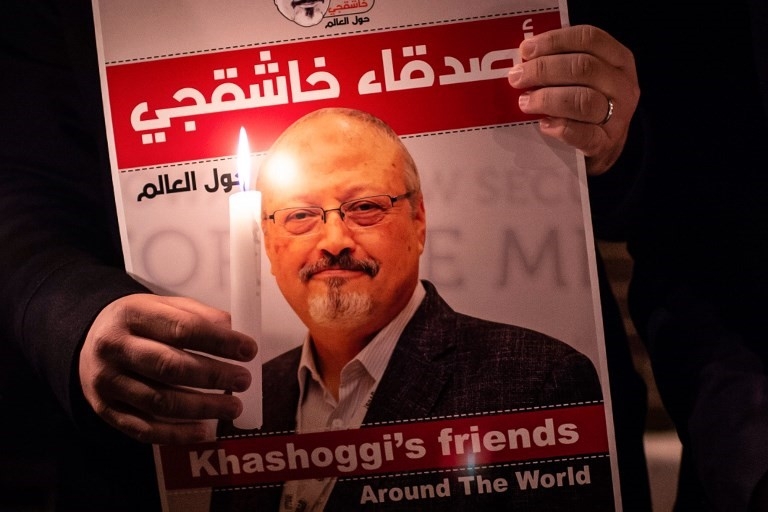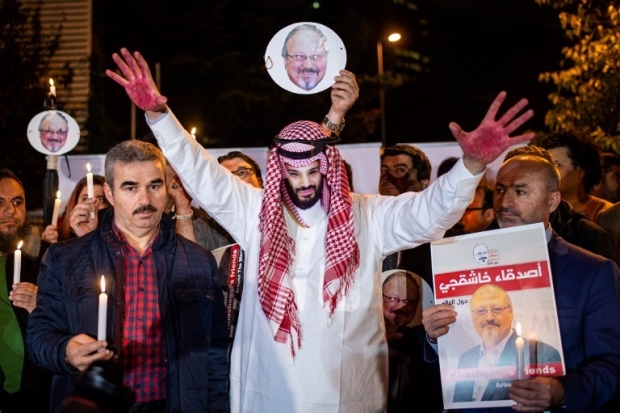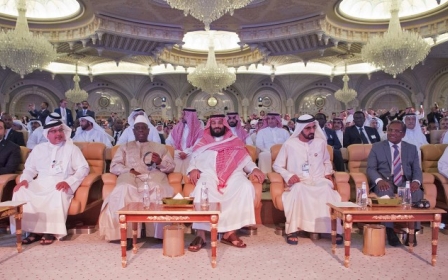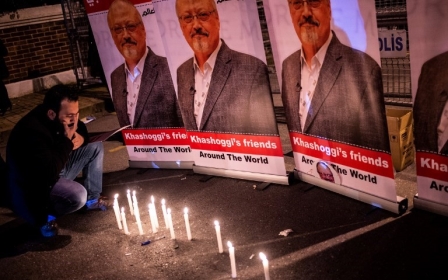Jamal Khashoggi: The Arab despots' existential enemy

For the last month, we have all been living in a film. Something that could have been scripted by Quentin Tarantino. It's a drama that straddles two eras.
The first is the 21st century, when a fast-talking 33-old year Saudi Prince strides onto the world stage as a reformer - confident, corner cutting, the scourge of the old, the bearer, we are told, of "moderate" Islam. Jamal Khashoggi once told me that this "moderate" prince was building himself his fourth yacht.
Medieval savagery
But this story has only one foot in the 21st century. The other foot is in the 10th century. This was when lords of the manor descended into their dungeons to hear the screams of their captives. Jamal Khashoggi was killed with medieval savagery. His screams were recorded by his killers. He took seven minutes to die.
This is the point at which the actions of a Saudi prince are indistinguishable from that of the Islamic State (IS). The moderate becomes the monster.
Until Khashoggi's murder on 2 October at the Saudi consulate in Istanbul, the border between 21st century and 10th century was frictionless. Imagine if Khashoggi had not stepped into the consulate. The great and the good would have descended on Davos in the Desert, Saudi Arabia's investments conference held in Riyadh last week.
Uber, Richard Branson, and Christine Lagarde, the International Monetary Fund's (IMF) managing director, would have fawned at the feet of the boy king, while the population of Hodeidah starves. They genuflect to tyranny with a lip gloss of liberalism.
Jamal Khashoggi was killed with medieval savagery. His screams were recorded by his killers. He took seven minutes to die. This is the point at which the actions of a Saudi prince are indistinguishable from that of the Islamic State
After four weeks of lies and bribes, an avalanche of evidence points to the Tiger Squad, a covert unit whose commanders were handpicked by the Saudi crown prince, but of whose deeds in Istanbul he professes to be totally ignorant. The crown prince is unaware, too, of the four phone calls the head of the death squad, Maher Mutreb, made to his own chief staff on 2 October, the day of the killing.
So, the crown prince has silenced a voice. But in the process he has turned himself into a toxic brand. He is now the last person you would want to be seen with. Unless of course you are John Flint, the CEO of HSBC. Flint admitted on Monday that it had been a "difficult few weeks for the kingdom". He understood "the emotion" behind the story, but "it's hard to disengage with Saudi Arabia".
Despots' enemy
How interesting that a proven crime, conducted by state officials on state property, has managed to become a subject of emotion rather than international law. You would imagine an international banker, like Flint, to be rather keen on international law.
The millions of dollars spent plastering the prince’s face over the billboards of London, buying think tanks, academics, and journalists, have been consumed in the wildfire of Khashoggi's murder.
Jamal Khashoggi has touched a guilty nerve in all of us. It was not what he said so much what he refused to say that made him the existential enemy of despots. It was his moderation, his credibility, his legitimacy that so alarmed illegitimate rulers. He refused to toe the line, to shut up, to take the king's shilling. Had he done so, he would be rich and very much alive today.
Jamal Khashoggi has touched a guilty nerve in all of us. It was not what he said so much what he refused to say that made him the existential enemy of despots
But Khashoggi would not play the game. He once told me how humiliated he felt after a year of silence. "What's the point of being a journalist if you cannot write what you see in front of you? It's not my job. It's my duty." I sat there nodding. But I don’t think any of us appreciated the danger he was in.
Has anything changed four weeks on?
A turning point
Khashoggi's murder has shown us that the West's closest allies are not just unstable, but a source of regional instability. That arch disciple of realpolitik, the US Defence Secretary Jim Mattis, must really be asking himself, who damages American interests more: its enemies or its allies?
Despots never tire of telling us that Arabs are not mature enough for democracy. It's the other way round. Despots never know when their time is up. The Arab state is dying in their hands. Everyone knows this, from the nationalist to the Islamist, from the secular to the religious and from the liberal to the conservative.
Jamal Khashoggi knew this truth and paid for it with his life. His death may yet prove to be a turning point.
The tragedy is that it took Khashoggi's death for the mask to slip, for the two worlds to collide. For, if ever the page of history turns, it can only be with people like Khashoggi that the region will build a more stable future.
I will miss him, the Arab Peninsula will miss him. The Arab world will miss him. He is a true hero of our times.
This article is based on a speech made at a memorial event for Jamal Khashoggi in London on 29 October.
- David Hearst is editor-in-chief of Middle East Eye. He was chief foreign leader writer of The Guardian, former Associate Foreign Editor, European Editor, Moscow Bureau Chief, European Correspondent, and Ireland Correspondent. He joined The Guardian from The Scotsman, where he was education correspondent.
The views expressed in this article belong to the author and do not necessarily reflect the editorial policy of Middle East Eye.
Photo: A demonstrator holds a poster picturing Saudi journalist Jamal Khashoggi and a lighted candle during a gathering outside the Saudi Arabia consulate in Istanbul, on 25 October, 2018 (AFP)
Middle East Eye propose une couverture et une analyse indépendantes et incomparables du Moyen-Orient, de l’Afrique du Nord et d’autres régions du monde. Pour en savoir plus sur la reprise de ce contenu et les frais qui s’appliquent, veuillez remplir ce formulaire [en anglais]. Pour en savoir plus sur MEE, cliquez ici [en anglais].






